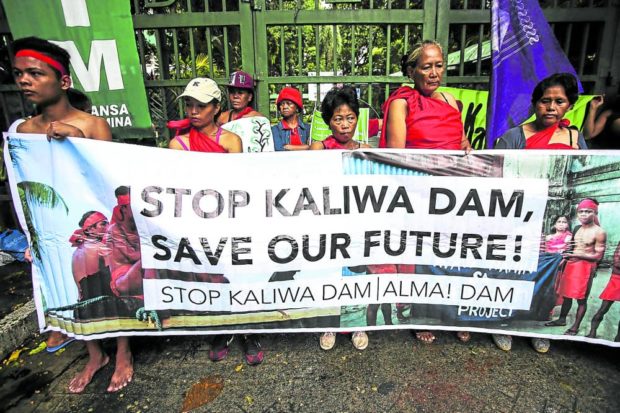‘False consent,’ priest says of Kaliwa Dam OK

TRIBE’S VOICE In this photo taken in 2019, environmental activists and members of indigenous peoples groups picket in front of the Department of Environment and Natural Resources offices in Quezon City to ask for a dialogue with agency officials as they call for the rejection of Kaliwa Dam’s environmental compliance certificate. —GRIG C. MONTEGRANDE
LUCENA CITY, Quezon, Philippines — Critics and leaders of groups opposing the construction of the P12.2-billion Kaliwa Dam in the Sierra Madre mountain ranges said they were dismayed over reports that the project had been granted consent by indigenous peoples (IPs), stressing that the process had been “manipulated.”
“They have manipulated false consent from the IPs,” Fr. Pete Montallana, chair of the Save Sierra Madre Network Alliance Inc. (SSMNA), told the Inquirer on Monday.
Montallana, who is serving under the Prelature of Infanta, Quezon, said the “certificate of precondition” (CP) from the National Commission on Indigenous Peoples (NCIP) “is based on the assumption that the three IP communities to be submerged [by dam water] agreed.”
“They did not,” Montallana stressed.
He called on the people to continue efforts in stopping the construction of Kaliwa Dam. Montallana also directed this appeal to President Marcos and to local governments.
Article continues after this advertisement“I call on the people to weigh in climate justice. [I also appeal to] local governments and [President Marcos] to protect the well-being of the people, not the [rich],” he said.
Article continues after this advertisementMontallana, addressing the President, said: “Don’t add more sufferings to us, who are now [dealing with the impact of the] economic crisis.”
In earlier reports, Leonor Cleofas, administrator of the Metropolitan Waterworks and Sewerage System (MWSS), said the agency had secured all the necessary permits to undertake the New Centennial Water Source-Kaliwa Dam Project in the Sierra Madre.
These include the CP from the NCIP, which means that the MWSS had secured the free, prior and informed consent (FPIC) of concerned IP communities.
The FPIC is a requirement under the Indigenous Peoples’ Rights Act of 1997, which prevents, among others, the IPs from being relocated without their consent.
“In fact, we have signed a memorandum of agreement with the IPs of Rizal and Quezon. These are separate because they are separate ancestral domains,” Cleofas told reporters on Monday.
Under the law, the government can only start infrastructure projects on ancestral lands if it has secured the FPIC certificate from titleholders.
Barring any delays, the tunnel boring may start as early as next week as the equipment is already in place, MWSS Chair Elpidio Vegas said.
The MWSS has long been pushing for the construction of the Kaliwa Dam to address the projected water crisis in Metro Manila.
Protest looms
Dumagat tribe leader Marcelino Tena insisted that most members of IP communities in Sierra Madre did not approve of the FPIC.
In a separate online interview, Tena said the affected IPs were ready to hold another protest march from northern Quezon province to Metro Manila to voice their continued opposition to the dam project.
In 2009, tribesmen, farmers, and religious and environmentalist groups staged a 148-kilometer protest march from General Nakar, Quezon, to Metro Manila to dramatize their opposition to the Laiban Dam project in the Sierra Madre.
The government was forced to abandon the project.
Tena also asked Mr. Marcos to stop the dam construction in the spirit of Christmas.
Gina Cambronero, program coordinator of Sandiwa, a network of advocates for national minorities, has expressed shock and fear over the prospect of boring holes in the Sierra Madre.
“The boring of tunnels into the mountains of Sierra Madre is a worrying and frightening vision. It is not enough reason to say that the machines of the MWSS are already in place for them to start making the tunnels,” she said.
Cambronero added: “In the realization of a development project, it is best to consider the welfare of the majority of residents and the future of coming generations.”
The Kaliwa Dam project would submerge parts of the Sierra Madre in Tanay town, Rizal province; and General Nakar and Infanta towns in Quezon.
The dam is expected to flood a watershed area of 9,700 hectares and displace 1,465 families, according to studies conducted by SSMNA. Groups opposing the project also fear that it will endanger more than 100,000 lives once the dam is built.
The dam’s construction was awarded to the Chinese company, China Energy, under an official development assistance agreement between the Philippine and Chinese governments.